Would you like to know the SEO mistakes to avoid as a small business?
If you’re running a small business and are a one-person marketing team, you’ll find that you’re also responsible for ranking your site and driving traffic. And with so many hats to wear as a small business owner, any small mistake in your marketing can lower your rankings in search results and ultimately cost you time and money.
In this post, we’ll show you the common SEO mistakes to avoid as a small business.
In This Article
What is SEO?
Search engine optimization (SEO) is the practice of improving your site and its content to increase visibility on search engines when people search for keywords and topics related to your business.
Because Google has the biggest search engine market share, over 83%, most SEO strategies are geared toward ranking on Google. However, the same strategies can also help you rank on other search engines like Bing, Yandex, Firefox, and more.
Why Is SEO Important to Your Business?
There are several reasons why SEO is important to your business. Here are the main ones:
Generates Organic Traffic
One of the most important reasons to invest in SEO is that it generates organic traffic. This is free traffic from people searching on browsers like Google, Bing, Firefox, etc. Besides being free, organic traffic has the advantages of bringing in qualified leads and being sustainable long-term.
Increases Brand Awareness and Authority
Another benefit of SEO is that it helps you increase brand awareness. As searchers encounter your brand regularly after making search queries, they become more familiar with it. These regular encounters also result in you building brand authority. Searchers will trust your content more than content from other brands.
Helps with Brand Reputation
Brand reputation is an asset that’s critical to business growth. The more reputable your brand is, the more likely searchers will click on your search listing and convert to paying customers. Reputation management is another significant benefit of SEO. By ranking high on SERPs, you control the narrative of what your target audience knows about your brand.
SEO Mistakes Every Small Business Should Avoid
Now that you know what SEO is and why it’s important to your business, let’s dive into the common SEO mistakes you should avoid.
1. Not Using an SEO Plugin
One of the biggest SEO mistakes many small businesses make is not using an SEO plugin. SEO plugins help you optimize various aspects of your website and content for search.
When it comes to WordPress SEO plugins, it doesn’t get any better than the original WordPress SEO plugin — All In One SEO (AIOSEO).
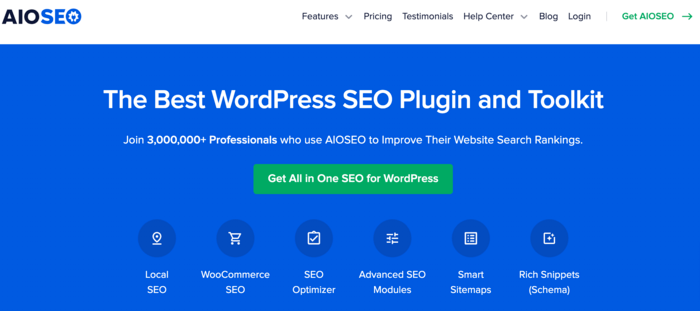
AIOSEO is the best WordPress SEO plugin on the market and is trusted by over 3 million savvy website owners and marketers to help them dominate the SERPs and drive relevant traffic to their sites. This is because the plugin has many powerful SEO features and modules to help you optimize your website for search engines and users. Examples of said features include:
- Next-gen Schema Generator: This makes adding any type of schema markup super easy.
- Redirection Manager: Helps you manage redirects and eliminate 404 errors, making it easier for search engines to crawl and index your site.
- Link Assistant: Powerful internal linking tool that automates building links between pages on your site. It also gives you an audit of outbound links.
- SEO Preview: The SEO Preview tool gives you an overview of your search and social snippets and general SEO so you can improve your optimization.
- IndexNow: For instantaneous indexing on search engines that support the IndexNow protocol (like Bing and Yandex).
- Robots.txt editor: Gives you full control over the instructions you give web crawlers about what folders and files to crawl on your WordPress site.
Installing a powerful SEO plugin like AIOSEO will help DIY your SEO. You won’t have to spend much money hiring an SEO expert.
For step-by-step instructions on how to install AIOSEO, check out our installation guide.
2. Failing to Add Schema Markup to Posts and Pages
Schema markup is a piece of code you inject into a page or post to help search engines better understand your content. This results in better indexing and leads to your content ranking higher for relevant searches.
While schema markup, also called structured data, sounds like an SEO strategy for advanced SEOs, it isn’t. That’s because powerful plugins like AIOSEO make it easy to add schema markup without touching a single line of code.
AIOSEO will automatically add schema markup without any configuration needed, and it just works out of the box. But it also has some incredibly powerful customization features to help you take it to the next level.
This is all thanks to AIOSEO’s next-gen Schema generator.
To add schema markup using AIOSEO, open your target page in editor mode, scroll down to AIOSEO Settings, and then click on Schema.
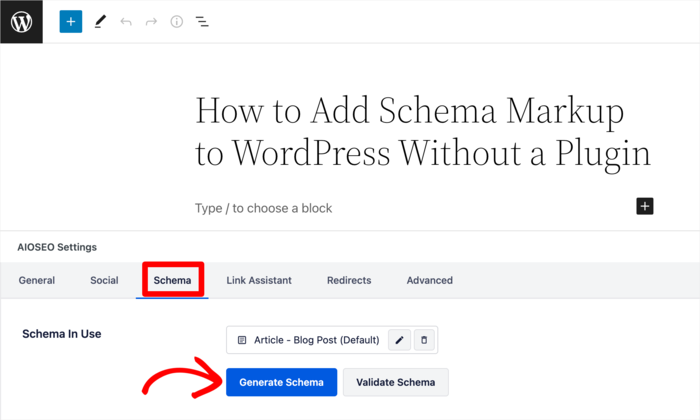
By default, the schema type will be set to Article. You can remove this by clicking the trash can icon. Alternatively, you can add another schema type to your page by clicking on the Generate Schema button. Doing so will open the Schema Catalog, from which you can choose the schema you want to add.
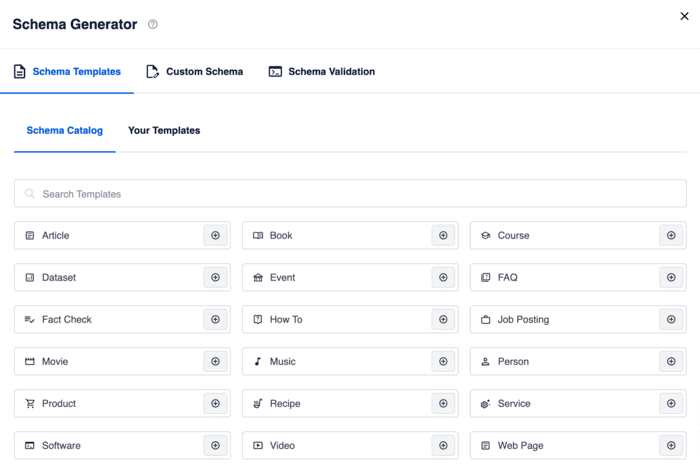
Here, you can select the schema type you want to add to your page.
For more information on adding schema markup, check out this step-by-step tutorial.
One of the biggest advantages of adding schema markup to your pages is that it helps search engines generate rich results for your search snippets.
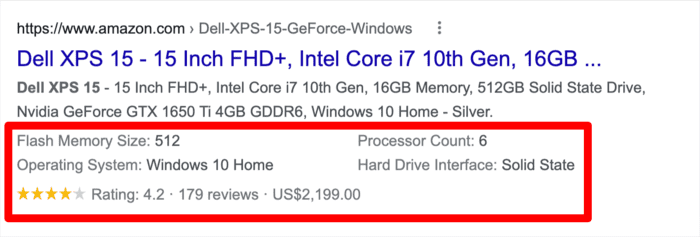
Rich snippets are search listings with more information than traditional snippets, leading to increased CTRs and better rankings.
Besides rich snippets, schema markup can also improve your chances of landing the coveted featured snippet, also known as “position zero.” This results in a boost in traffic to your website.
3. Not Connecting to Google Search Console
Another SEO mistake small businesses make is not connecting their website to Google Search Console (GSC). GSC is a free tool from Google that lets you see how your site performs in search and what you can do to improve it. For example, it helps you:
- Confirm that Google can locate and crawl your WordPress site
- Submit new content for indexing
- Easily submit sitemaps
- Analyze your site’s impressions, clicks, and position on Google
- See which search queries (search terms) cause your site to appear in search results
GSC is one of the SEO tools every digital marketer needs to help them fine-tune their SEO campaigns. This is why you must not ignore this powerful tool. Instead, ensure you connect it to your WordPress site.
For detailed instructions on connecting GSC to your WordPress site, check out this easy-to-follow guide.
With AIOSEO, you also get our proprietary Google Search Console integration called Search Statistics.
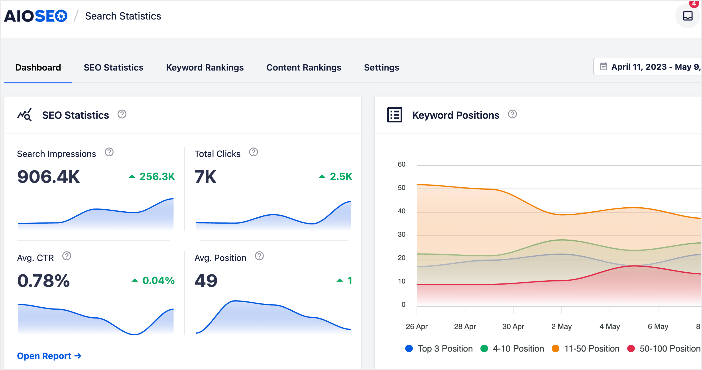
This powerful module gives you a lot of SEO data pulled from GSC, right within your WordPress dashboard. You get critical SEO metrics like search impressions, total clicks, average CTR, keyword positions, and more.
All this data is essential in helping you monitor your SEO performance. As a result, you can make data-driven decisions that can help you get better results from your SEO strategies.
4. Neglecting Internal Link Building
As you create content for your small business blog, you should build internal links between your posts and pages.
Internal links are essential to SEO as they encourage visitors to your site to explore other pieces of content. As a result, this helps you boost your conversion rates.
Another reason internal links shouldn’t be neglected because they help spread link equity across your site. This helps ensure that all pages on your site stand a better chance of ranking in search.
Building internal links can be a time-consuming and laborious task if done manually. Thankfully, you can automate this using AIOSEO’s Link Assistant.
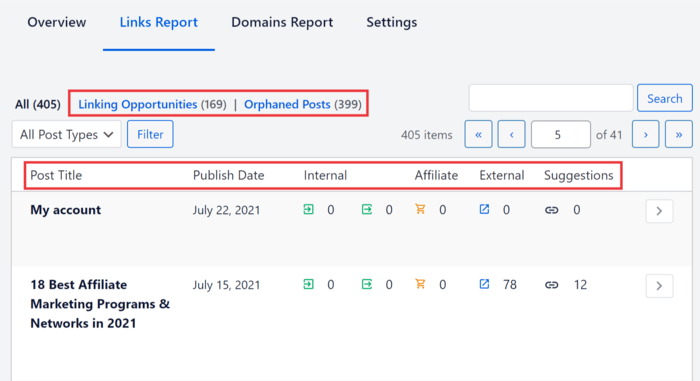
This powerful tool helps you find linking opportunities on your site and automates the building of links between related pages. Not only does this save you time, but it boosts your SEO too.
Check out our Link Assistant tutorial for step-by-step instructions on using this powerful tool.
5. Focusing on Traffic Alone
Another common mistake many small businesses make with their SEO is focusing on traffic alone. Unless your business model is built on ads, optimizing for traffic alone won’t do you any good.
After all, what good is traffic if you can’t convert it to paying customers?
So, instead of focusing on traffic, focus on attracting visitors who are more likely to turn into customers. One way of doing this is by conducting intent-based keyword research. This will help you create content that meets search intent.
Another way to ensure you only drive qualified traffic is by creating content tailored to your target audience’s needs. If you sell a technical product, tutorials and other types of bottom-of-the-funnel (BoFu) content will serve you well here.
So, instead of just focusing on traffic, focus on meeting your users’ needs.
6. Ignoring Meta Tags
Ignoring meta tags is another common SEO mistake to avoid. While meta tags are not directly a ranking factor, they greatly impact your SEO.
That’s why you must take time to create optimized meta tags. You should also go the extra mile to check if your meta tags are properly optimized. This is super easy with our SEOP Preview tool.
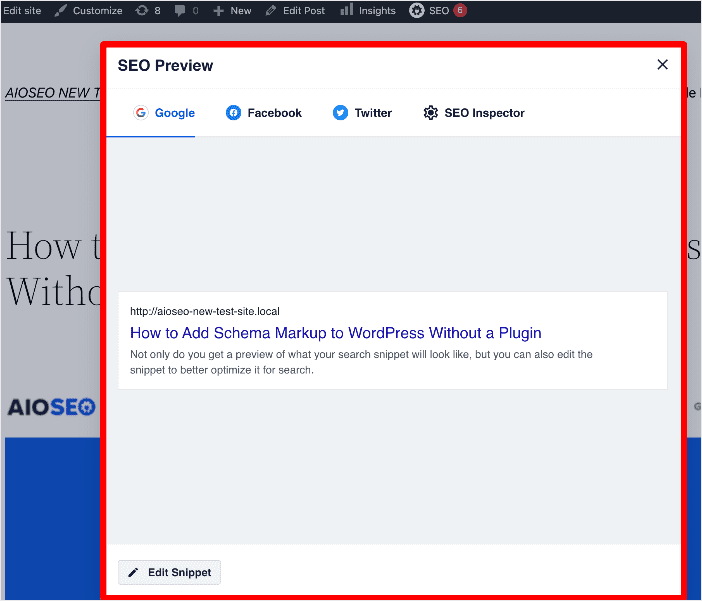
A few ways of optimizing your meta tags include:
- Include your keyword
- Keep them within the prescribed character limits
- Make them descriptive
You can check out our guide to writing meta descriptions that convert for more tips.
Crafting optimized meta tags may seem like extra work, but they help improve your organic clickthrough rates and boost your SEO.
7. Neglecting Image Optimization
Images are an excellent way to encourage visitors to engage with your content. However, they can slow down your site and hurt your SEO if not used properly.
You must optimize your images for search engines and user experience. Our Image SEO module is a powerful tool that can help you do that. To access it, go to your AIOSEO menu » Search Appearance » Image SEO.
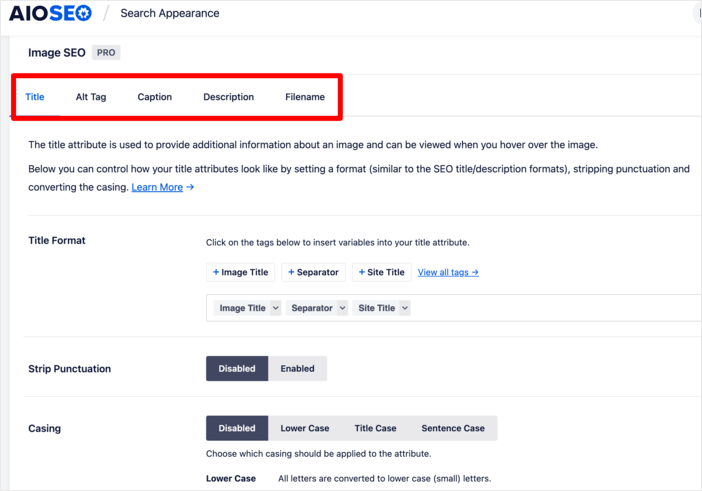
A few ways to optimize your images include:
- Use the right image format
- Use descriptive image names
- Add image alt tags
- Add Facebook Thumbnails and Twitter Cards
- And more
For a more comprehensive guide on image SEO, check out this article.
8. Neglecting Local SEO
Local SEO should be a priority if you’re a service-based business or a business that relies on foot traffic.
Local SEO refers to strategies a business uses to improve its online visibility to reach a location-specific audience. For instance, if you run a brick-and-mortar store or offer local services like plumbing, you can use your website to reach a local audience using local SEO best practices.
You can use AIOSEO’s Local Business SEO module to increase your visibility for local searches and on Google Maps.
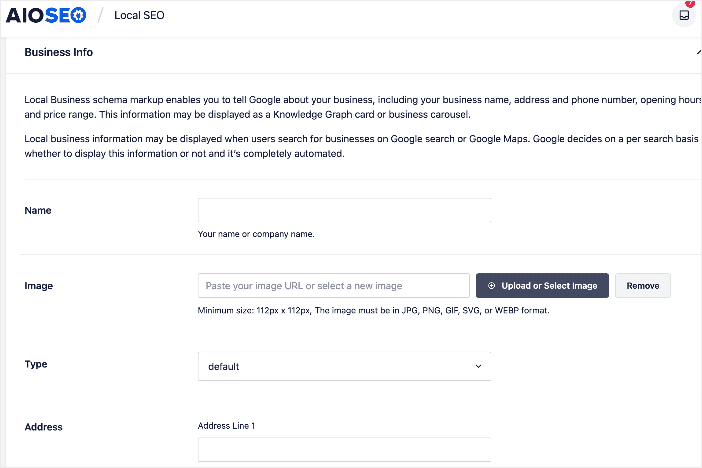
Not only will this module help you rank high for local searches, but it will also result in more customers for your business. You can also check out our list of the top local SEO tools for other plugins and software you can use to boost your local SEO.
Avoid These SEO Mistakes and Grow Your Business
We hope this post has helped you know the SEO mistakes to avoid as a small business. You may also want to check out other articles on our blog, like our guide on SEO scams to be wary of and the top 7 SEO secrets used by pros to drive revenue.
If you found this article helpful, then please subscribe to our YouTube Channel. You’ll find many more helpful tutorials there. You can also follow us on Twitter, LinkedIn, or Facebook to stay in the loop.
Disclosure: Our content is reader-supported. This means if you click on some of our links, then we may earn a commission. We only recommend products that we believe will add value to our readers.
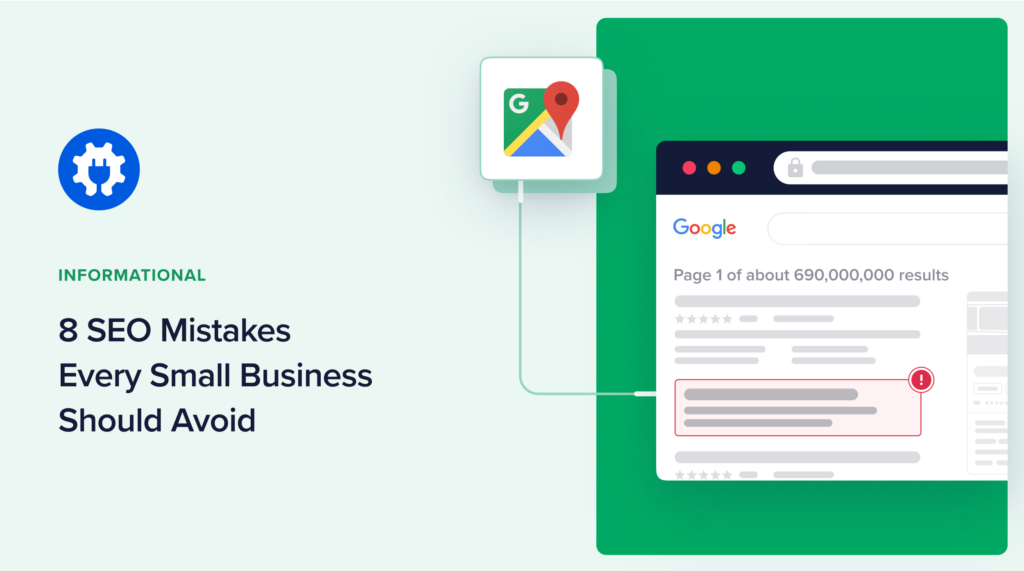

Wonderful tips!
Very good article. I have made a good website but dont know how to market it on google.
This is really help me.